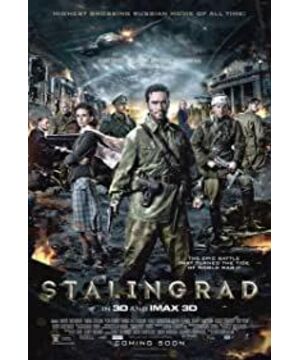This is a Russian 3D film based on the bloodiest battle in the history of the Soviet-German war. The film has achieved good box office results with its luxurious production lineup and classic war themes.
As the turning point of the Second World War, the Battle of Stalingrad has been brought to the big screen many times. There are not only the masterpiece "Battle of Stalingrad" showing the grand scenes of the war, but also the film "Come on the City" which tells the deeds of heroes. However, different from these traditional perspectives of war, this film focuses on the ordinary soldiers and civilians who actively or passively participated in the war, and implements the overall situation with the love story between the two military and civilians.
The film unexpectedly begins with the earthquake relief scene in Japan. A doctor tells the story of his mother and five fathers in order to appease the emotions of the five victims buried under the rubble. When the Stalingrad War broke out, the civilian girl Kaja (the narrator's mother) who lived here was stranded in an old house on the banks of the Volga River, and the Soviet troops who forced the river across the river suffered heavy losses, and the surviving Very few people also chose this house as their stronghold, and they met like this. In this cruel war environment, everyone's life was threatened from time to time, and a feeling of mutual dependence gradually developed between the Soviet soldiers and Kaja.
Kaja is a young girl, she is afraid of war, but still lives strong in war. The continuous artillery fire took away many people around her. Her home, her house, and her city had long been shattered under the repeated competition between Sude and Germany, but she still stood here. To a large extent, the director imaged the character Kaja. He did not give her a specific story background, nor did he give her a detailed explanation of the emotional development between her and the soldiers. "Kaja" is more like It is a spiritual symbol, the idea that supports the soldiers to keep fighting, and the little bit of good comfort in the hearts of the soldiers who have witnessed too many cruel and painful scenes. Her refusal to retreat is not only personal courage and persistence, but also reflects the dedication and confidence of all Soviet people in defending their homeland.
Captain Gromov once persuaded Kaja to retreat to the rear: "I am not at ease with you here. They are fighting now, not for the motherland, for Stalingrad, but for you!" This sentence sincerely expresses the common soldiers. The voice of the heart, no matter how loud the slogan is, it is nothing but an empty form. After all, the soldiers who are willing to defend with their lives are the people around them. For the story behind each soldier, the film also gave a brief introduction in the form of narration: some of them are veterans, some are avengers who lost their loved ones because of the German army, and some were once famous tenors Singers, although they fought for different reasons, were all equally robbed of what they once held dear to the protracted war. Therefore, after meeting Kaja, all the soldiers carefully protected her and cared for her, pouring on her their love for the deceased mother, wife, children, and the nostalgia for the once ordinary but happy life .
Another main line of the story is Peter Kahn, a German officer who was also stationed in the riverside area. He was born into a nobleman, has strong self-esteem, believes that his country is fighting for honor, and he despises hiding in the dark and shooting black guns in street fighting. He also looked down on the people of Stalingrad who could not defend himself, which made him often angry, and vented this anger needlessly on ordinary Soviet civilians; but deep down, he hated war very much, He misses his hometown and his relatives in his hometown. When he notices Masha, a Soviet girl who looks very similar to his wife, he can't help falling in love with her, and even insists on taking care and protecting her despite the opposition of his colleagues and superiors. Compared with the stylized Soviet soldiers, this character is more vivid and three-dimensional. The war failed to bring him the glory and fame he wanted, only endless pain and torture. He hated his weakness because of love, so Deliberately be rough, but then start to hate himself for being a beast in the war. The girl he fell in love with, Martha, was forced to be involved in this bloody human tragedy. Like all the people in the enemy-occupied areas who had to escape or had no time to escape, she had to face the ruthless German army all day long. The special care by the officers made her also spurned by her own countrymen. This is two people distorted by war, and it is also a love distorted by war, but when Martha chased out the door and asked if Kahn would come back, as an audience, he couldn't help but express the expected tragic ending. sigh.
It is true that as a film reflecting the historical theme of major wars, "Stalingrad" still has some obvious shortcomings and flaws: for example, the connection between the two stories is not close enough, which makes people wonder how the narrator learns about the progress of the two sides; for example The characters of the Soviet soldiers are not clear enough, and most of the effective information depends on the narrator's narration. But on the whole, this is a sincere film, which tells the reflection on the war, the commemoration and memory of the ordinary people in the war. It is not only a film that shows the strategies and tactics of both sides and is full of magnificent battle scenes to reflect the famous bloody battle of Stalingrad, but more importantly, the people who participated in this war. Many "kaja" constitute the beauty of life. Many Kaja's houses form a solid front to stop the spread of war, and many warriors who defend the houses form the home that will always be peaceful and prosperous.
"They gave life and freedom to thousands of people, and they made us know nothing about war today." Thanks to them, Stalingrad of ordinary people.
View more about Stalingrad reviews











